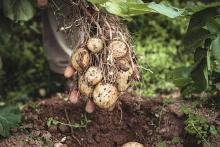Farmers who convert their land to organic will receive up to double the amount of the previous subsidies as the government begins to recognise the environmental benefits of organic farming.
Payments for organic farming are rising by between 46 and 500 per cent under a new Countryside Stewardship scheme. The new payments will be available until at least 2024 when a new organic standard is promised as part of the wider plan for how farmers will be supported by the government post-Brexit.
It coincides with news that the organic food market continues to out-perform sales of non organic food, with sales rising by 5.2 per cent in the last year, helped by shopper interest in ethics, the environment and health during the pandemic.
“The good things that agroecological and organic farmers are doing, which have long been overlooked, are now set to be rewarded under the new Environmental Land Management Schemes,” said organic sector advisor for the Soil Association, Adrian Steele.
“The longer-term goals that government has set out for agriculture, with a new focus on protecting soils, wildlife and the environment, are in harmony with the principles of organic farming.”
Steele said the increased payments, plus growth in the organic market, should give farmers confidence in switching to or maintaining organic practices, despite the short-term uncertainty facing every farm.
Associate director for food and farming at land agent Savills, Tom Cackett, said organic farming is a good solution to combining space and protection for nature, with the needs of food production.
“Instead of marginalising nature, why not integrate it across the whole farm, and then you’ll also be able to get those payments for the whole area instead of just for the corners or edges,” he said.

“If you’re doing good things for the environment, it seems almost certain there will be funding to support that for the foreseeable future. With the increase to organic management payments, the organic farming sector is one of the only sectors that isn’t going to see such a dramatic drop in subsidy income,” he added.
Despite shoppers choosing to buy organic food more frequently, particularly online and through box schemes, the total area of land farmed organically has remained largely the same, suggesting farmers have so far been reticent to trust that demand will remain high.
Inflation is now making headlines in anything from food to energy and there are questions over whether this will put people off buying organic food, despite its benefits to environmental issues, biodiversity and health through no chemicals being used.
However, land in conversion to organic did rise by 12 per cent during 2020, a figure the new payments increases is likely to further boost.
Organic farmer Ben Andrews said: “Now we’re having a cost-of-living crisis, but I think organic farming can be more resilient to market changes. You are often less vulnerable to any big fluctuations in commodity prices because you’re running a more circular system without bringing so much onto the farm.”
While payments to most types of organic farming will increase, including to existing farmers and those about to convert, payments to those already farming organic permanent grasslands are set to halve, something the Soil Association called disappointing.
Permanent grasslands are a vital way of improving soil health, fixing nitrogen into the soil to displace the use of nitrogen fertilisers and providing vast and long-term soil carbon stores.
“We are surprised and disappointed by the reduction for ongoing management of organic, nature-rich grasslands, and we have taken this up with Defra as part of our efforts to lobby for adequate recognition for all sustainable farming practices,” said Steele.













It’s good to know that my money will go to support organic farming rather than military spending and other ridiculous schemes this government seems to like.
Excellent news, perhaps they could now consider ensuring farmers stop selling their land off to developers, that would save lots more wildlife.
Definitely a problem, but there can be lots of elements to what drives land sales – the onus should not be on the seller, but rather be on the planning system to ensure that environmentally damaging developments don’t happen.